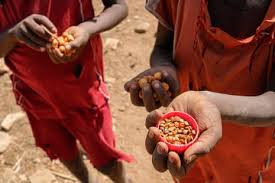The Nigerien government has announced a ban on the export of several staple cereals, including rice, millet, sorghum, cowpea, and maize. This decision, aimed at ensuring food security for the nation, reflects a growing concern over the availability of essential grains in the face of fluctuating global markets and regional challenges.
The Details of the Ban
According to an official statement from the Niger government, the export ban encompasses key agricultural products that are crucial for local consumption. The government has emphasized that while these grains cannot be exported to other countries, exceptions are made for exports to neighboring Mali and Burkina Faso, both of which are members of the Alliance of Sahel States alongside Niger. This regional cooperation aims to enhance food security and economic stability among the three countries, which are facing similar agricultural challenges.
The government’s decision is a proactive measure to safeguard domestic supplies, particularly in light of recent disruptions caused by climate change, economic pressures, and security concerns in the Sahel region. By restricting exports of these essential grains, Niger aims to ensure that its population has access to sufficient food, especially as the agricultural sector faces various challenges.
The Context of Food Security in Niger
Food security has become a pressing issue in Niger, where many citizens depend heavily on agriculture for their livelihoods. The country has experienced erratic weather patterns, including droughts and floods, which have adversely affected crop yields. Additionally, rising prices of staple foods due to global supply chain disruptions have raised concerns about the ability of households to afford essential goods.
The recent export ban is a strategic response to these challenges, reflecting the government’s commitment to prioritizing local food production and consumption. Ensuring that local farmers receive fair remuneration for their produce is another crucial aspect of this initiative. The government’s statement noted that it is actively considering measures to ensure producers are compensated adequately, thereby supporting the agricultural sector and promoting food sovereignty.
Regional Cooperation and Trade Dynamics
The decision to allow exports to Mali and Burkina Faso while banning sales to other nations highlights the importance of regional cooperation in addressing food security issues. The Alliance of Sahel States serves as a platform for member countries to collaborate on critical challenges such as agricultural production, trade, and food distribution.
By facilitating trade among these nations, the member states can work together to bolster their agricultural sectors and enhance food security. This approach not only supports domestic markets but also strengthens regional ties, fostering economic resilience in the face of external shocks.
Consequences for Non-Compliance
To reinforce the seriousness of this export ban, the Nigerien government has indicated that administrative and penal sanctions will be implemented against individuals or entities that contravene the measure. This step underscores the government’s commitment to enforcing the ban and ensuring compliance among traders and exporters.
By imposing strict penalties for violations, the government aims to deter potential breaches of the export ban, thus protecting local supplies and stabilizing food prices. This approach is essential in maintaining public trust and ensuring that the needs of the population are prioritized during this critical period.
A Broader Reflection on Food Security Strategies
Niger’s export ban on cereals is part of a broader trend across Africa, where countries are increasingly recognizing the need to protect their agricultural resources and ensure food security. As nations grapple with the impacts of climate change, economic fluctuations, and rising global food prices, many are implementing policies to safeguard domestic supplies.
This trend reflects a growing awareness among African governments of the importance of self-sufficiency and resilience in food production. By prioritizing local agriculture and minimizing reliance on imports, countries can enhance their food security and mitigate the risks associated with global supply chain disruptions.














Leave a comment